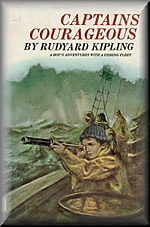
 Captains Courageous
Captains Courageous
Certainly one of the first fishing novels that I read as a child was Kipling's Captains Courageous. I have travelled a good bit on boats on several seas since then, but I have never and now will never sail on a true Gloucester fishing schooner. Wondering who could write with authority about this fishery, I recalled that Barry Fisher had told me of his experiences aboard one of the last of the schooners. It was a rugged apprenticeship, but one that would serve Barry well in the developing the Bering Sea trawl fishery. When I called Barry, he spoke with great fondness and familiarity of Captains Courageous but allowed there was one technical flaw. "Kipling has them fishing hand lines and long lines out of the same vessel, but the two were never fished at the same time," he said with real authority. Barry's further comments follow.
Rudyard Kipling in his book Captains Courageous laid out what was one of the more complete and sensitive understandings of a fishermen's values. The story concerns itself with a turn of the century chronicle of a spoiled rich kid who becomes a wholesome and worthwhile teenager as a result of constant tutelage by a highline Portuguese doryman. The book is a great novel in several senses. It is a rousing adventure story; Gloucester schooners sailing close-hauled to windward carrying every bit of cloth including the cooks apron, with high competition of individual vessels and dorys on the grounds, etc., etc.. The Grand Banks become a large and vivid school room for Harvey (the spoiled kid). He learns what's fair and square, he learns to work, he learns to be considerate of his shipmates, and above all he learns a fisherman's language and the ability to "gam" (tell stories).
It's easy for me to go overboard in the reading of this novel. It is the world that I knew as a boy. There were still schooners in Gloucester that dory fished. I and three other boys at the age of 12 were given a beat up dory to patch and use in Gloucester Harbor line trawling for flounders and cod and fishing a few lobster pots. We also went under the docks at low tide picking up scrap metal-a half a cent a pound for ferrous metals, a cent a pound for brass, copper, and bronze. I came home from the War (WWII) and started in dory fishing again. I was given a code to live by which essentially was the same code that was given to Harvey (the spoiled rich kid) by Captain Troop of the Gloucester schooner We're Here. My code or rules for life were given me by Captain Frank Hines of the Boston schooner Marjorie Parker: I came home in 1946 from the War to which I had gone as a very young merchant seaman. I was on wheel watch one night, on my first trip, when the captain, a skipper of dory schooners and an oral poet, came up on deck from the cabin. He checked the compass and said, "Young fellah, mind the course, steady as she goes, steer small." Then after a pause he added, "Face storm and the shoals of adversity square on. Remember, one hand for the vessel first, always first, and then one hand for yourself." "When, as they sometimes will, danger and death loom over the horizon and stand down upon you, don't panic. Meet them with your dorymate and shipmates; stand well braced and fend them off."
"Go joyously into the dory; whatever job of work there be, give it the finest and the best that is in you. Be good to your dorymate and your shipmates. Speak no ill of them."
"If you go aground, work yourself off. Cast off all self-pity and beat to windward again and again and again, so that in the fullness of your years, you can come about and run downwind free and easy with the tide. If life gives you more baitings than most share some of these extra rations with your dorymate and shipmates and them who have not been so lucky as you."
"Remember, life is a grand dance; pay the Old Fiddler as you enjoy it and find a good partner to dance with and to love. Do you understand, young fellah? Do you get my drift? R. Barry Fisher.

|
